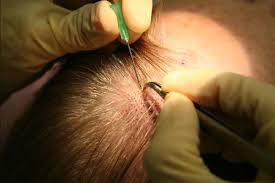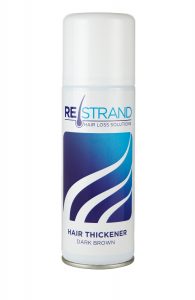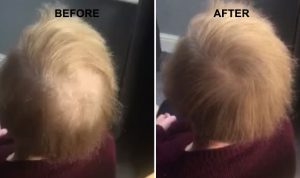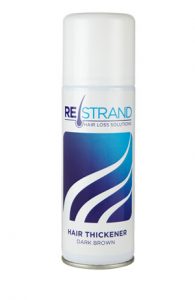Home » Hair Loss And Lifestyle (Page 3)
Category Archives: Hair Loss And Lifestyle
Top 5 Tips for Tackling PCOS Hair Loss
Polycystic Ovary Syndrome (PCOS), is a condition that affects around 1 in every 5 women within the UK. While the cause of the condition hasn’t yet been identified, experts believe that it’s centred around an abnormality in hormone levels, primarily, an increased insulin level. It is believed that the body produces higher insulin levels because PCOS suffers are very resistant to the sugar controlling ability of insulin.
Due to the higher levels of insulin, more male hormones are produced, like testosterone. There are also other factors associated with PCOS, including irregular periods and polycystic ovaries, which is where the eggs in the ovaries are surrounded by follicles and the ovary is enlarged.
The increased level of male hormones is what contributes to the hair loss suffered as a result of PCOS, with hair thinning and hair loss, both being possible. However, it’s not just hair loss that sufferers of PCOS face, but increased levels of hair growth in places like the chest and face.

Our Top 5 Tips
Along with medical treatment, making changes to your lifestyle can help to treat hair loss and other symptoms that occur in women with PCOS. We have put together 5 top tips, that can all help you to feel better and start to treat PCOS.
- Start a Daily Routine– Daily routines introduce many factors that can help to combat PCOS. Starting an exercise routine designed to reduce testosterone levels, getting the right amount of sleep to ensure that your hormone levels are regulated, and avoiding toxins in your environment that can cause a hormone imbalance, are all essential for PCOS sufferers.
- Take Care of Your Hair– While hair care is always important, it is even more so if you have PCOS. Reducing the amount of harmful hair products that you use, not washing the oils out of your hair too frequently, and completely avoiding hairstyles that mean pulling your hair back from the scalp, can help your hair to stay in better condition.
- Change Your Diet– A healthy diet leads to a healthy body. This is especially important with PCOS, as obesity can lead to even higher levels of insulin production. A healthy diet means switching to foods that are better for your body, such as foods with high protein levels and foods with healthy fats.
- Naturally Manage Your Hormone Levels– You can help manage your hormone levels with just a few changes to your lifestyle. Switching to organic food will limit the amount of toxins that you ingest through your food. Similarly, stopping smoking and excessive alcohol intake can help you to manage your hormone production.
- Regain Your Confidence with Hair Loss Spray– Stress plays a large role in the symptoms of PCOS, so minimising your exposure to stressful situations is important. However, for many, hair loss is an extremely stressful condition. Like the hair loss spray for women, there are similar products that can help you to regain your confidence, and minimise the stress of hair loss.
Learning that you have PCOS, and then having to deal with the symptoms, can be extremely hard. But with a few changes to the way you live, and with products to help you get your confidence back, PCOS can be managed.
How Does Winter Effect Hair Loss?
There has been a long held belief that people tend to lose more hair in the winter, so as the colder weather is just around the corner, it can be a worrying time for those who have concerns about thinning locks.
Although the idea that cold weather promotes hair loss continues to persist, lower temperatures in themselves do not have any effect on the amount of hair that is shed. In fact, studies have shown that people often lose least hair during the colder months. However, there are other factors at play which cause excess hair loss at this time of year.

The environmental changes that we experience during the winter can dehydrate the scalp – we are moving from a cold outdoor environment into the centrally heated indoor environment and the result of these rapid changes is a dry scalp paired with brittle hair. This damage is then exacerbated by wearing a hat, as the friction and stress on the strands of hair could end up causing clumps of hair to fall out.
Looking after your hair in winter
Taking proper care of your hair during the winter is very important to prevent the damage which can result in hair loss. Ensuring the scalp and hair remain well moisturised is key, and using a rich conditioner at least once per week is a good way to help minimise any damage. A shampoo which contains natural essential oils and shea butter, and which has no alcohol or harmful chemicals will help to guard against dry, frizzy hair which is prone to breakage, giving you the best possible chance to reduce the amount of hair lost during the colder months.
Another issue which may be experienced during the winter is seasonal hair loss. Everyone loses hair on a daily basis, with the average number being around 50 to 100 strands. However, at some times of year, the number will be closer to the upper end of that range, meaning that the loss is a lot more noticeable. As the most common time for this to happen is in October and November, it contributes to the idea that winter causes hair loss. The problem is actually called seasonal shedding, and while it is primarily noticed in women, it also occurs in men too.
The good news is that seasonal shedding is usually nothing to be concerned about, however if you think that more than 100 strands are being lost each day, or if you notice bald patches starting to appear, it could be a sign of pattern baldness instead.
If you are worried about your thinning hair, you may want to look at ways of disguising the problem. A hair loss concealer spray is one of the best options, since it coats the individual strands of hair to make them appear to have more texture whilst also looking thicker and fuller. Simple and convenient to use, a hair thickening spray can help to restore your confidence and to make you look and feel much younger.
The Inѕ аnd Outs of Hаіr Trаnѕрlаntаtіоn
Losing your hair is something which affects around half of all men, and can result in a lot of distress and worry. Many people who are suffering from baldness are constantly looking for different ways to resolve the problem so that they can once again enjoy having a full head of hair, and the confidence that goes with it. If you suffer from thinning hair and baldness, you may possibly have considered hair transplantation surgery, however this is a treatment that can prove to be extremely expensive as well as invasive. Here, we look at what exactly is involved in having a hair transplant.

What Exactly Is Hair Transplantation Surgery?
This kind of surgery involves taking hair from one area of the body and moving it to the head to cover bald patches. Although the first hair transplants were carried out as long ago as the 1950s, modern techniques have undergone a number of changes and there are now two methods which can be used. The first is a FUSS procedure (short for Follicular Unit Strip Surgery) and the second is called FUE (or Follicular Unit Extraction Surgery). The FUSS treatment involves having a strip of skin measuring between 6 and 10 inches removed from the head and then the scalp being sewed closed. The removed scalp is then split up into small grafts that have individual hairs on them. During the FUE method, the back of the scalp is shaved, the follicles removed, and grafts are prepared. For both methods, the next step is to have the grafts placed on the parts of the head where more hair is required. The entire procedure can take as long as 8 hours or as few as 4 depending on the site of the transplant.
How Well Will I Recover?
Hair transplantation is a form of surgery, so patients should expect their scalp to be painful for a few days following the procedure and may need to take strong painkillers. Bandages need to be worn for a few days and antibiotics may also need to be taken to prevent possible infections. Patients will also need to stay away from work for around 5 days. After a couple of weeks, patients will notice that the transplanted area of hair will fall out, and while this may be alarming, new growth will appear to cover that area within a couple of months, with most patients seeing brand new hair growth within 9 months of the treatment.
What Are The Downsides Of Hair Transplantation?
Hair transplant surgery is very expensive, and it also comes with several risks. Some patients experience infections or excessive bleeding, while others have scarring or unusual hair growth patterns. Some patients also find that their new hair follicles develop infections which need to be treated with antibiotics, and others find that they lose even more of their original hair at the site of implantation.
Should I Have A Hair Transplant?
Not everyone is a good candidate to have hair transplantation surgery. The candidates who are most likely to be successful are men who have had a steady pattern of hair loss over many years, but whose balding appears to have stabilized. They should also be in good health and be non-smokers in order for the procedure to be most effective.
If you decide that surgery is not the right option for you, there are other ways to disguise the problem of thinning hair that are much more cost-effective and considerably less invasive. A hair loss spray for men can coat the individual strands of hair to cover bald patches and to make the existing hair appear fuller, helping to restore the attractive appearance of your hair while boosting your self-confidence.
Problems Only Bald Men Will Understand
Baldness may seem like a minor problem, but for many sufferers it is a constant source of worry and stress. Yet with almost 50% of men suffering from hair loss of some kind, it is an incredibly common condition. If you are suffering from thinning hair, you will probably recognise the following problems which will only be understood by bald men.

- Anger at your family members – when you start going bald, you end up looking at the other men in your family and feeling angry about the nature of hereditary baldness. You’ll also be furious at any men in your family who still have hair.
- Difficulty describing yourself – whether you’re going on a blind date or just arranging to meet someone new it can be hard to know how to describe yourself. Should you make light of the situation and joke about your baldness or should you skirt around it and risk sounding ridiculous by saying that you have “a receding hairline”?
- People telling you that you look better than ever – although your friends are probably trying to make you feel good about yourself, you know really that it is usually a lie.
- Forgetting that you had hair – eventually a time will come when you have completely forgotten what it was like to have hair, but then at some point you’ll find an old photograph and you’ll feel furious all over again.
- Looking older than your years – losing your hair can make you appear to be older than you really are. If you just have a small bald spot or receding from the temples you might be mistaken for being just a few years older, but if you have just a few hairs left you could find that you are mistaken for being in an entirely different generation.
- Denying the truth – when your hair first starts to fall out you are bound to go through the denial phase. You’ll try to reassure yourself that it’s just excess body hair and that you’re way too young to have this problem.
- Growing facial hair – when men start going bald, one of the first things that they often feel the need to do is to grow a beard, as if to prove that they are still capable of growing hair – just not on their head.
- Having a cold or burnt head – most balding men expect their head to start to feel colder than when they had hair, however they are often taken aback by just how cold it can become. Conversely on hot days, there is also the risk of ending up with a burnt scalp.
If you have found that you’re starting to lose your hair, one useful temporary solution is to use an instant hair thickener. By covering bald patches and coating the hair to give the illusion of extra fullness your confidence can be restored and your hair will look great again.




Recent Comments